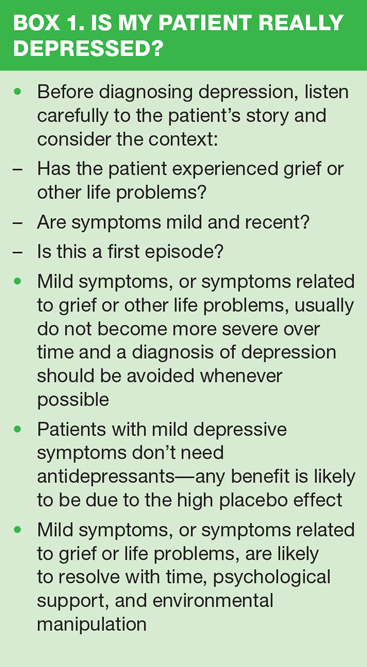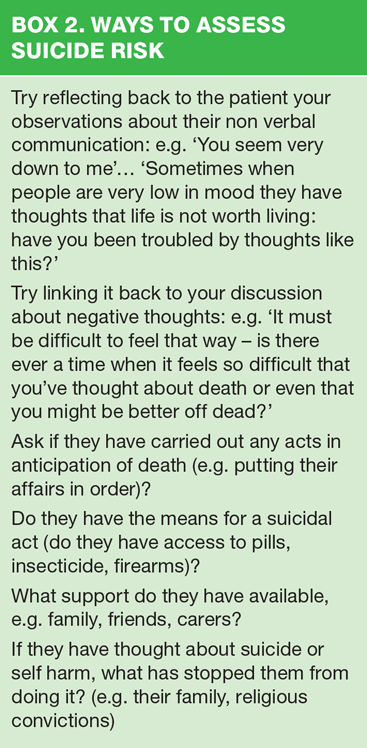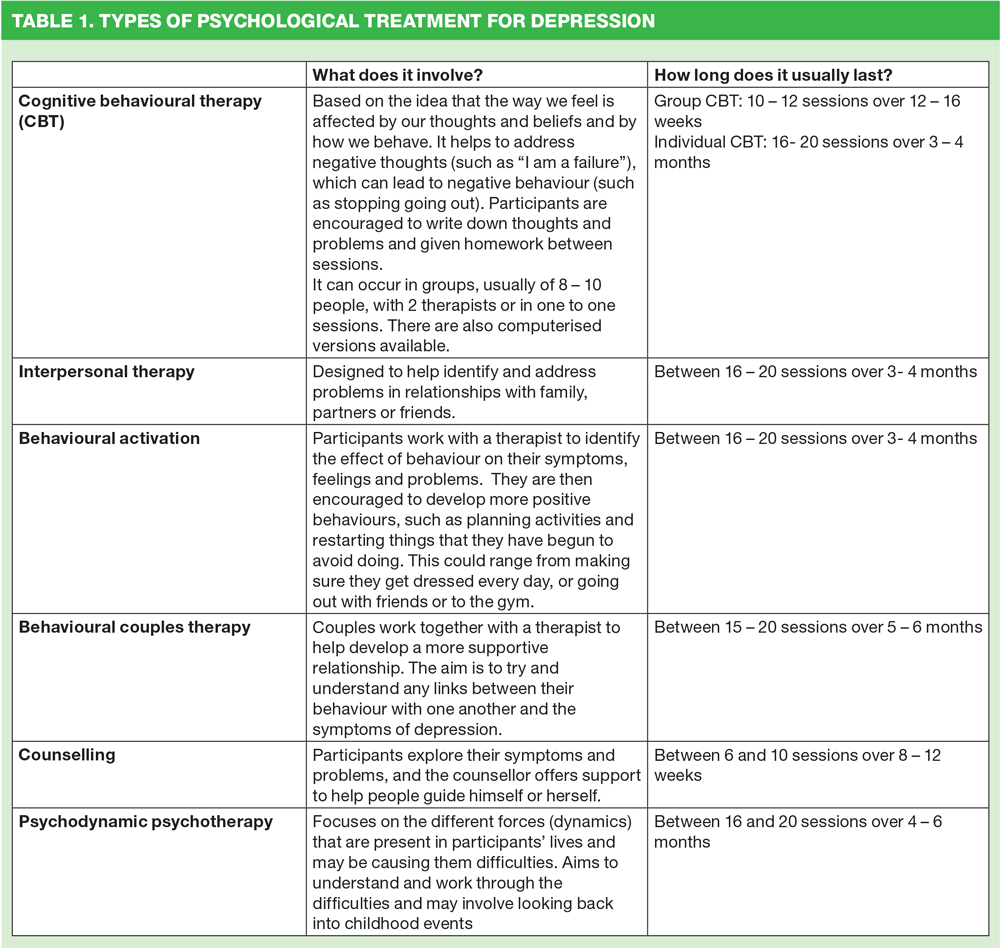
A Practice Nurse guide to common mental health problems: Depression
Dr Mandy Fry, Portfolio GP & Oxford GP School Senior Programme Director (Retainers & GP I&R Scheme)
Dr Mandy Fry, Portfolio GP & Oxford GP School Senior Programme Director (Retainers & GP I&R Scheme)
Last month we looked at common mental health disorders that may impact on a practice nurse’s practice in general terms: in this article, we focus on depression in greater detail
Depression is one of the commonest mental health problems, which affects up to 1 in 6 people in the UK, with anti-depressant prescriptions having doubled over the past decade.1,2 Despite this increase in prescribing it is estimated that up to 35% of those with depression remain undiagnosed and so are not in receipt of treatment of any form.3 The economic cost of depression remains substantial with 78% of the cost being associated with lost employment rather than the service costs associated with medication or psychological therapies.4 Men aged under 45 years who have a diagnosis of depression have a 55% chance of not being in employment compared to 11% for those without mental health issues. So it is right that there is an increasing emphasis on trying to identify and treat mental health disorders. However, it is worth remembering that not all sadness is depression and that sometimes feeling low and losing interest in things is a normal human response to life events.5
Let’s consider John, a 42-year-old man who comes to see you for some smoking cessation advice. You ask John what has motivated him to want to give up smoking. John tells you that he wants to make sure that he lives long enough to see his children grow up. At this point John starts crying and you establish that his father has recently been diagnosed with lung cancer and is not expected to live for more than a few months.
It is of course possible that John is depressed, or that he might go on to develop depression. However, at the moment he is probably just responding to the external events that are currently manifest in his life. What John most likely needs is time for someone to listen to his story and promote the value of time as a healer.6 You could also suggest some strategies that might help him build his own resilience and strengthen his support structures. Given that John has come for smoking cessation advice you have the perfect opportunity to see him again and check how he is doing. Even if this were not the case, it would be good practice to arrange to see John again in a couple of weeks to ensure that the situation is not deteriorating.
You listen to John and offer your support in facing this difficult situation. You then address his need for help with stopping smoking and arrange for him to try some nicotine replacement therapy, as John is still keen to try and stop despite the increased stress he is under. You arrange a follow up appointment in two weeks time and, to maintain continuity, you make this with John yourself to ensure that he comes back to you, rather than one of your nursing colleagues. You make a note on the medical record to ensure that you don’t forget to follow up on this next time.
Box 1 gives some useful pointers about considering whether or not someone who appears to be low in mood is suffering from depression.
Of course the situation could be significantly different. Perhaps John comes to see you after struggling for several months with low mood and tearfulness, and it is now interfering with his work and affecting his relationship with his wife. In that case, even if there is an external stressor such as his father’s terminal illness, John may well fulfil the criteria for a depressive illness. Even so antidepressants may not be the answer but John may benefit from one of the psychological therapies recommended by NICE for mild to moderate depression.1 (Table 1) You could also signpost him to some of the self-help strategies that I suggested in the introductory article (Practice Nurse July 2015).7
Having a working knowledge of what is involved in different types of psychological therapies can be helpful for patients. Which treatment they are offered should depend as much on their preferences as it does on what options are available.1 However, that involves asking patients to make choices about things that are unfamiliar to them at a time when they may already be struggling with decision-making. Being able to use a familiar healthcare professional as a sounding board can really help.
Now let’s turn to another patient, Maria.
Maria, age 32, comes to see you for a contraception review. She is well settled on the combined oral contraceptive and there are no contraindications to her continuing with it. She is not keen on any longer acting form of contraception. You weigh her and notice that she has lost 2 stone in weight since she was last seen 12 months ago. You congratulate her on this achievement at which point she starts crying. She tells you that she has not really been trying to lose weight but that she discovered her husband had been having an affair with a younger woman at work.
Like John, Maria’s sadness could be seen as a natural response to external life events and weight loss of itself is not a marker for depression. However, on reviewing Maria’s record, you can see that she suffered from severe depression when she was in her 20s, including a significant suicide attempt. This may well influence the next treatment strategies for Maria, and it is important to consider what worked well for her previously.
You offer Maria support and ask her how she is coping. You mention that you can see that she has been depressed in the past and wonder whether she thinks she might be getting depressed again. You also ask her how low she has got, and whether she has thought about harming herself. Maria admits that she has been concerned that she might be getting down again and had been wondering what to do. She tells you that last time she was on antidepressant therapy and also had some talking therapy.
Establishing the suicide risk is an important part of the assessment of anyone who has possible symptoms of depression as it helps you to work out how urgently you need to arrange further investigation and treatment. (Box 2) Asking about suicide can be difficult and obviously needs to be tailored to the particular individual. There is no evidence that asking about suicide increases the potential risk of suicide,8 and often patients are actually relieved to be able to talk about their feelings.
Given Maria’s past history of significant depression it may be appropriate to consider using anti-depressant therapy at an earlier stage than you might otherwise do so.1 Also as her symptoms have obviously been going on for several months it seems likely that Maria’s situation warrants some form of intervention, be that medication and/or psychological therapies, as it has clearly had a significant impact on her life.
NICE1 suggests that anti-depressants have a limited role in the treatment of depression and should certainly not be used in patients who have mild symptoms, as they may well respond to self help strategies or watching and waiting. However, they do have a role in individuals with moderate to severe forms of depression, or for those who have had recurrent episodes. For these patients they can work well as an adjunct to psychological therapies, and the best outcomes are seen for patients who subscribe to both talking treatments and medication.1 One way of describing this is to consider patients with depression as being stuck in the centre of a maze that they are unable to find their way out of. Medication can be like offering the patient a box to stand on, such that they can see over the top of the hedges that form the maze. Nevertheless, they still need to find their way out, which is where psychological therapies can help.
The precise antidepressant to choose often depends on local formularies. NICE advocates the use of one of the newer forms of antidepressants, the selective serotonin uptake inhibitors (SSRIs) such as fluoxetine or citalopram. For patients such as Maria, who have had previous experience, it makes sense to consider what worked well and was tolerated previously. It is worth noting that SSRIs can take up to two weeks to have a beneficial effect, although there is some suggestion of immediate effects.9 They are usually very well tolerated, with the main side effect being nausea that tends to settle within the first couple of weeks of treatment. SSRIs are not addictive but it is possible to get withdrawal symptoms on stopping treatment, so patients should be encouraged to seek advice as to how to do this safely, usually by gradually reducing the dose rather than stopping abruptly. The usual duration of treatment is for six months after the patient feels back to their normal self, and there is some evidence that the observed increase in antidepressant prescribing can be at least partially attributed to longer courses being prescribed appropriately.10
Both John and Maria had external life events that will probably have exacerbated, if not caused, their symptoms of low mood – but sometimes patients develop depression without any external stimulus. It can be particularly hard for these individuals to make sense of their situation. The stepped care model advocated by NICE is still the appropriate way to approach these patients,1 although they may struggle to see how talking therapies can be helpful ‘when there is nothing to talk about’. So, for these patients, having an understanding of the different options available can be particularly useful as they may well benefit from CBT or behavioural activation therapies.
With support and appropriate treatment the majority of people with depression can go on to lead rich, fulfilling lives. As practice nurses you can make a real difference in ensuring patients get the help they need, which may be as simple as being a listening ear. You can also help to support patients in their recovery by encouraging people to continue with their treatment, even when it seems difficult. They may also need support in having discussions with their family and friends or employers, where they may still face stigma and discrimination. Being non-judgmental, empathetic and able to listen are core skills of being a practice nurse. Given that these same skills are the cornerstones of dealing sensitively with mental health problems, even those who are not mental health specialists are well placed to make a real difference.
- A Practice Nurse guide: Common mental health disorders Dr Mandy Fry, Practice Nurse 2015;45(7):26-31
- Anxiety and depression: the hidden cost of long-term conditions, Joanne M Haws, Practice Nurse 2015;45(4):41-45
REFERENCES
1. NICE CG90. Depression in Adults: the treatment and management of depression in adults, 2009. https://www.nice.org.uk/guidance/cg90
2. Donnelly L. Record numbers on ‘happy pills’ Daily Telegraph, 20 April 2014
3. Singleton N, Bumpstead R, O’Brien M
Psychiatric Morbidity Among Adults Living in Private Households, 2000. London: The Stationery Office.
4. Kings Fund. Paying the price – the cost of mental health care in England in 2026, 2008 http://www.kingsfund.org.uk/sites/files/kf/Paying-the-Price-the-cost-of-mental-health-care-England-2026-McCrone-Dhanasiri-Patel-Knapp-Lawton-Smith-Kings-Fund-May-2008_0.pdf
5. Dowrick C, Frances A. Medicalising unhappiness: new classification of depression risks more patients being put on drug treatment from which they will not benefit. BMJ 2013;347:f7140
6. Van Avendonk M, van Weel-Baumgarten E, van der Weele G, et al. Summary of the Dutch College of General Practitioners’ practice guideline on depression. Ned Tijdschr Geneeskd 2012;156:A5101
7. Fry M. Common mental health problems. Practice Nurse 2015;45(8):26-31. http://www.practicenurse.co.uk/index.php?p1=articles&p2=1171
8. Centre for Suicide Research, Department of Psychiatry, University of Oxford. Assessing suicide risk in people with depression – a clinical guide http://cebmh.warne.ox.ac.uk/csr/clinicalguide/index.html
9. Murphy SE, Norbury R, O’Sullivan U, et al. Effect of a single dose of citalopram on amygdala response to emotional faces. Br J Psychiatry 2009;194(6):535–540.
10. Moore M, Yuen HM, Dunn N, et al. Explaining the rise in antidepressant prescribing: a descriptive study using the general practice research database. BMJ 2009;339:b3999.
Related articles
View all Articles


